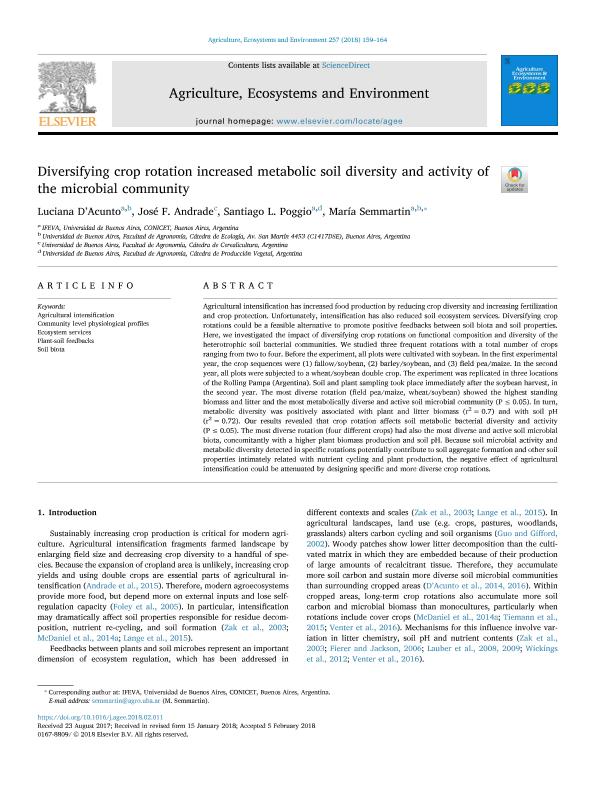Artículo
Diversifying crop rotation increased metabolic soil diversity and activity of the microbial community
Fecha de publicación:
01/04/2018
Editorial:
Elsevier Science
Revista:
Agriculture, Ecosystems and Environment
ISSN:
0167-8809
Idioma:
Inglés
Tipo de recurso:
Artículo publicado
Clasificación temática:
Resumen
Agricultural intensification has increased food production by reducing crop diversity and increasing fertilization and crop protection. Unfortunately, intensification has also reduced soil ecosystem services. Diversifying crop rotations could be a feasible alternative to promote positive feedbacks between soil biota and soil properties. Here, we investigated the impact of diversifying crop rotations on functional composition and diversity of the heterotrophic soil bacterial communities. We studied three frequent rotations with a total number of crops ranging from two to four. Before the experiment, all plots were cultivated with soybean. In the first experimental year, the crop sequences were (1) fallow/soybean, (2) barley/soybean, and (3) field pea/maize. In the second year, all plots were subjected to a wheat/soybean double crop. The experiment was replicated in three locations of the Rolling Pampa (Argentina). Soil and plant sampling took place immediately after the soybean harvest, in the second year. The most diverse rotation (field pea/maize, wheat/soybean) showed the highest standing biomass and litter and the most metabolically diverse and active soil microbial community (P ≤ 0.05). In turn, metabolic diversity was positively associated with plant and litter biomass (r2 = 0.7) and with soil pH (r2 = 0.72). Our results revealed that crop rotation affects soil metabolic bacterial diversity and activity (P ≤ 0.05). The most diverse rotation (four different crops) had also the most diverse and active soil microbial biota, concomitantly with a higher plant biomass production and soil pH. Because soil microbial activity and metabolic diversity detected in specific rotations potentially contribute to soil aggregate formation and other soil properties intimately related with nutrient cycling and plant production, the negative effect of agricultural intensification could be attenuated by designing specific and more diverse crop rotations.
Archivos asociados
Licencia
Identificadores
Colecciones
Articulos(IFEVA)
Articulos de INST.D/INV.FISIOLOGICAS Y ECO.VINCULADAS A L/AGRIC
Articulos de INST.D/INV.FISIOLOGICAS Y ECO.VINCULADAS A L/AGRIC
Citación
D'acunto, Luciana; Andrade, José Francisco; Poggio, Santiago Luis; Semmartin, María Gisela; Diversifying crop rotation increased metabolic soil diversity and activity of the microbial community; Elsevier Science; Agriculture, Ecosystems and Environment; 257; 1-4-2018; 159-164
Compartir
Altmétricas




